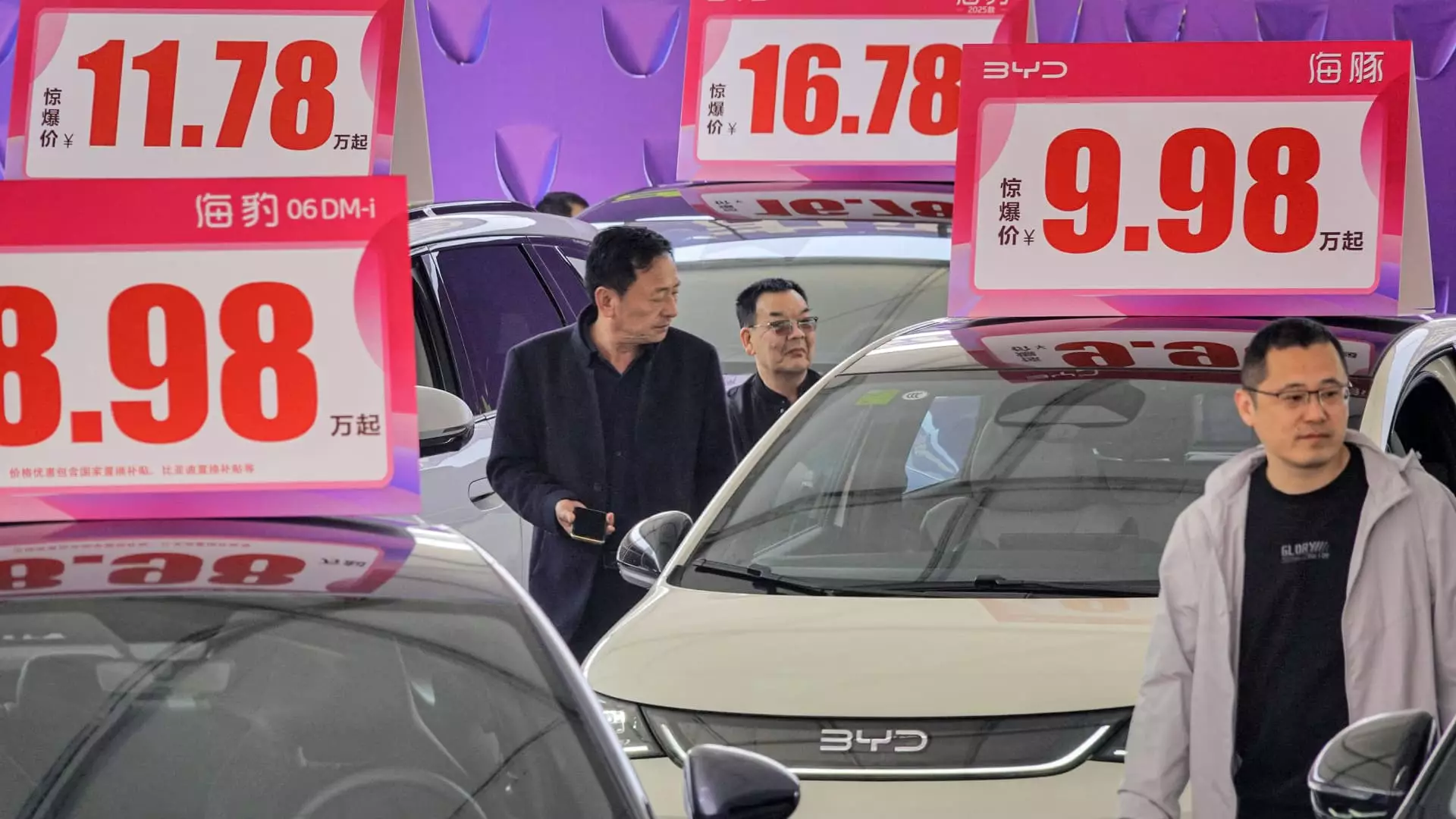The electric vehicle (EV) landscape in China is evolving at an unprecedented pace, marking what some might describe as a volatile transition from ambition to disarray. The recent announcement from BYD, a dominant player in the market, regarding massive price reductions—some models slashed by 30% or more—has sent ripples of anxiety throughout the automotive industry. The budget-oriented Seagull compact car now sits at a surprisingly low entry price of 55,800 yuan (approximately $7,750). This aggressive pricing strategy isn’t just a simple reaction; it’s a declaration of war against competition, where the stakes are high and the landscape unpredictable.
Analysts, like Zhong Shi from the China Automobile Dealers Association, have termed the situation as a state of “relative shock,” suggesting that the industry is not just reacting; it is reeling from the implications of BYD’s maneuvers. The price cuts place smaller automakers at a significant disadvantage, raising questions about their long-term viability in a market that increasingly resembles a battleground.
The Deflation Dilemma
The ramifications of this intense price competition extend beyond the confines of the automotive sector, hinting at broader economic repercussions. Morgan Stanley’s Chief China Economist, Robin Xing, remarked that the price cuts signify an alarming continuation of a supply-demand imbalance that fosters deflation rather than encouraging genuine consumer interest. The pattern suggests that despite calls for a shift towards a consumption-driven economic model, the ethos of supply-driven expansion stubbornly remains in place. As this price warfare persists, questions of sustainable growth loom large. Will constant discounting stimulate consumer interest, or does it merely mask deeper, systemic issues?
The dynamics of China’s EV market have been shaped, in part, by a prior price war triggered by Elon Musk’s Tesla. The fear now is that the aggressive pricing strategies may lead to a market collapse resembling the catastrophic fallout from the Evergrande real estate crisis. Great Wall Motors Chairman Wei Jianjun’s comparison of the rapidly growing electric vehicle industry to the precariously overheated real estate sector paints a grim picture. As stakeholders become increasingly concerned about financial health and sustainability, one has to wonder about the unseen costs of this competitive frenzy.
The Shadows of Deception
In China’s push for electric vehicle dominance, the repercussions of past policies are beginning to surface. Investigations found that at least five companies had defrauded the government of substantial subsidies—over 1 billion yuan ($140 million)—in an environment flooded with startups, most of whom had no sustainable business practices. This raises an unsettling question about the integrity and longevity of China’s EV narrative. Are we seeing the beginning of a tumultuous breakdown, fueled by reckless financial behavior and market saturation?
Amidst these strikes, the average price of retail cars has dropped by nearly 19% over the past two years, significantly affecting the consumer perception of value in this burgeoning sector. The average electric vehicle in the U.S., in stark contrast, continues to rise in price, showcasing that while China may assert dominance through quantity, the quality and value perception in other markets are paramount.
The Global Ripple Effect
The aggressive pricing strategies adopted by Chinese automakers have caught the attention of international regulators. Faced with the prospect of cheap imports flooding their markets, the European Union and the United States have enacted protective tariffs on vehicles manufactured in China. Yet, the efficacy of these measures remains questionable, especially as companies like BYD found success in European sales that outpaced Tesla for the first time, highlighting a potential resistance to such tariffs.
This trend raises significant concerns for the global auto industry. The crux of the issue isn’t simply about market share—it’s about fostering a competitive landscape that champions innovation over merely lowering prices. There is a pressing need for a recalibration of business strategies, focusing on quality enhancements and technological advancements rather than the reduction of profit margins.
Rethinking Valuable Competition
China’s top leadership has recently urged measures to mitigate “involution,” a term denoting non-productive competition. As auto manufacturers carve out their niches by slashing prices, we witness an ironic twist: an oversupply of affordable electric vehicles—yet, a scarcity of robust innovation. This contradiction raises fundamental economic questions. Should the focus remain solely on cost-cutting, or should companies leverage competitive advantages through technological advancements and premium offerings?
As we navigate this unsettling panorama, it is evident that the electric vehicle industry, especially in China, is at a crossroads. The relentless race to the bottom has potential implications for economic stability and raises serious questions about the viability of the industry’s future. Embracing a strategy that emphasizes quality, sustainability, and ethical practices may be the antidote to the current malaise—otherwise, we might witness a market correction that could have dire consequences for all involved.

